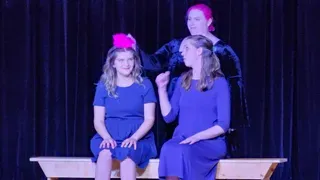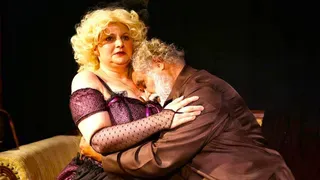April 4, 2023
Review: 'El Houb' Proves The Closet Cannot Contain One Man's Identity Crisis
Matthew Creith READ TIME: 3 MIN.
"We'll be stared at, we dare not go outside."
Co-written and directed by Shariff Nasr, "El Houb" translates to "The Love," and signifies one man's journey of self-discovery as he contends with his queer identity. Born and raised in a community that doesn't understand what it means to be homosexual, Karim (Fahd Larhzaoui) is a gay Moroccan-Dutch man living in fear of losing his family because of who he is and loves. Karim's world comes crashing down when his conservative Muslim father (Slimane Dazi) uncovers Karim's truth, and the secret is forced out. Now, Karim must withstand hatred from his parents and his homophobic brother, so he literally locks himself in a closet at the family's home until they can reach some sort of understanding amongst adults.
Unlike the slow-burn of the similar Moroccan feature "The Blue Caftan" last year, "El Houb" is flashy and straight to the point. Karim's frustrations with his family's religious and cultural values threaten his mental health, and force him to confront the problem head-on. While locked away in the closet, flashbacks of Karim's life come flooding back into focus, leading the audience to believe he's been dealing with queer issues for quite some time. Other friends' similar experiences of being cut out of their families, Karim's own upbringing, and his escapades in gay bars meeting love interests come into full focus as Karim must climb the mountain of self-imposed exile.
"El Houb" is hauntingly authentic, inspired by a true story examining one man's world and the damage his repression has done to his life. Co-written by Nasr, Philip Delmaar, and star Fahd Larhzaoui, the movie grows in intensity as Karim's psyche is entirely unveiled to the audience. His family might be narrow-minded and unable to listen to his pleas for compassion, but Karim must also be prepared for the fallout of his admissions. His parents can only think about appearances, what others will say, and what they perceive as Karim's embarrassment upon their lives. While locked away in the closet, Karim ruminates on his past and what his identity will mean for his family's future.
Nasr does a terrific job introducing a new concept to the coming-of-age trope in "El Houb." Even though Karim is a grown man with individuality and emotional resonance, his feelings and expressions seem transcendent. His self-reflection is evident early in the film, and only gets more profound and detailed as the movie progresses. Fahd Larhzaoui elevates the film by making Karim a fully realized character with love in his heart for a specific man, confronting his family's traditions, and summoning the courage to go against the grain when least expected. He faces real hurdles in this family drama, but Larhzaoui ensures Karim is not viewed as a stereotype. He's sexy, determined, emotionally sensitive, and complex.
"El Houb" is a poignant peek into one family's handling of a queer coming-out story. The film helps translate cultural differences and a generational divide while trying to comprehend the modern gay experience. Repression, adversity, and unconditional love pull into focus under Shariff Nasr's well-crafted and unique vision. The final sequence is an intimate look at one man's attempt for peace within a world crashing down on him, only to find that what he's looking for has been in front of him the whole time.
"El Houb" releases theatrically in select theaters on April 7 and will also be available on digital and DVD on April 4.







